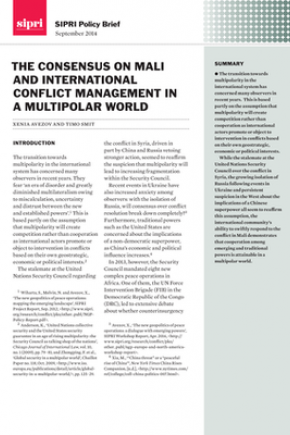The Consensus on Mali and International Conflict Management in a Multipolar World
The transition towards multipolarity in the international system has concerned many observers in recent years. This is based partly on the assumption that multipolarity will create competition rather than cooperation as international actors promote or object to intervention in conflicts based on their own geostrategic, economic or political interests.
While the stalemate at the United Nations Security Council over the conflict in Syria, the growing isolation of Russia following events in Ukraine and persistent suspicion in the West about the implications of a Chinese superpower all seem to reaffirm this assumption, the international community’s ability to swiftly respond to the conflict in Mali demonstrates that cooperation among emerging and traditional powers is attainable in a multipolar world.


